Entrepreneurship Report: Ventures, Economic Impact, and Brexit
VerifiedAdded on 2020/11/12
|16
|4579
|64
Report
AI Summary
This report provides a comprehensive overview of entrepreneurship, encompassing various types of entrepreneurial ventures such as social enterprises, lifestyle firms, growth firms, and opportunistic ventures, as well as micro, small, and medium-sized enterprises. It delves into the similarities and differences between these ventures, highlighting their contributions to social and economic development, employment generation, and risk profiles. The report examines the significant impact of micro and small ventures on the UK economy, emphasizing their role in job creation, innovation, and overall economic stability. Furthermore, it explores the importance of small and start-up businesses in fostering social economic growth in the post-Brexit landscape. The report also assesses the characteristics, traits, and skills of successful entrepreneurs, and the impact of their backgrounds and experiences on their entrepreneurial endeavors. The analysis underscores the critical role of entrepreneurship in driving economic growth, innovation, and social well-being.

Unit-9
Entrepreneurship
Entrepreneurship
Paraphrase This Document
Need a fresh take? Get an instant paraphrase of this document with our AI Paraphraser
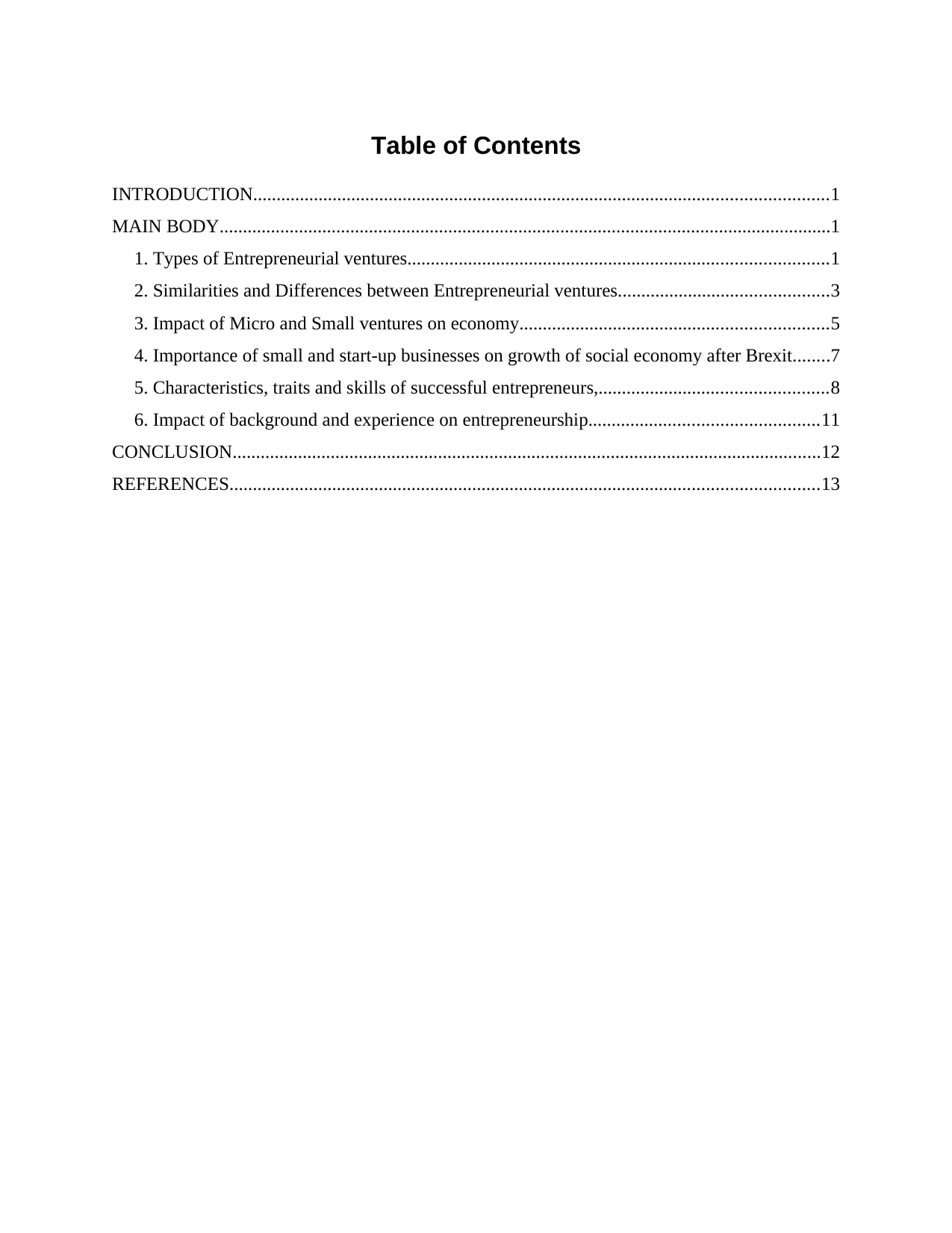
Table of Contents
INTRODUCTION...........................................................................................................................1
MAIN BODY...................................................................................................................................1
1. Types of Entrepreneurial ventures..........................................................................................1
2. Similarities and Differences between Entrepreneurial ventures.............................................3
3. Impact of Micro and Small ventures on economy..................................................................5
4. Importance of small and start-up businesses on growth of social economy after Brexit........7
5. Characteristics, traits and skills of successful entrepreneurs,.................................................8
6. Impact of background and experience on entrepreneurship.................................................11
CONCLUSION..............................................................................................................................12
REFERENCES..............................................................................................................................13
INTRODUCTION...........................................................................................................................1
MAIN BODY...................................................................................................................................1
1. Types of Entrepreneurial ventures..........................................................................................1
2. Similarities and Differences between Entrepreneurial ventures.............................................3
3. Impact of Micro and Small ventures on economy..................................................................5
4. Importance of small and start-up businesses on growth of social economy after Brexit........7
5. Characteristics, traits and skills of successful entrepreneurs,.................................................8
6. Impact of background and experience on entrepreneurship.................................................11
CONCLUSION..............................................................................................................................12
REFERENCES..............................................................................................................................13
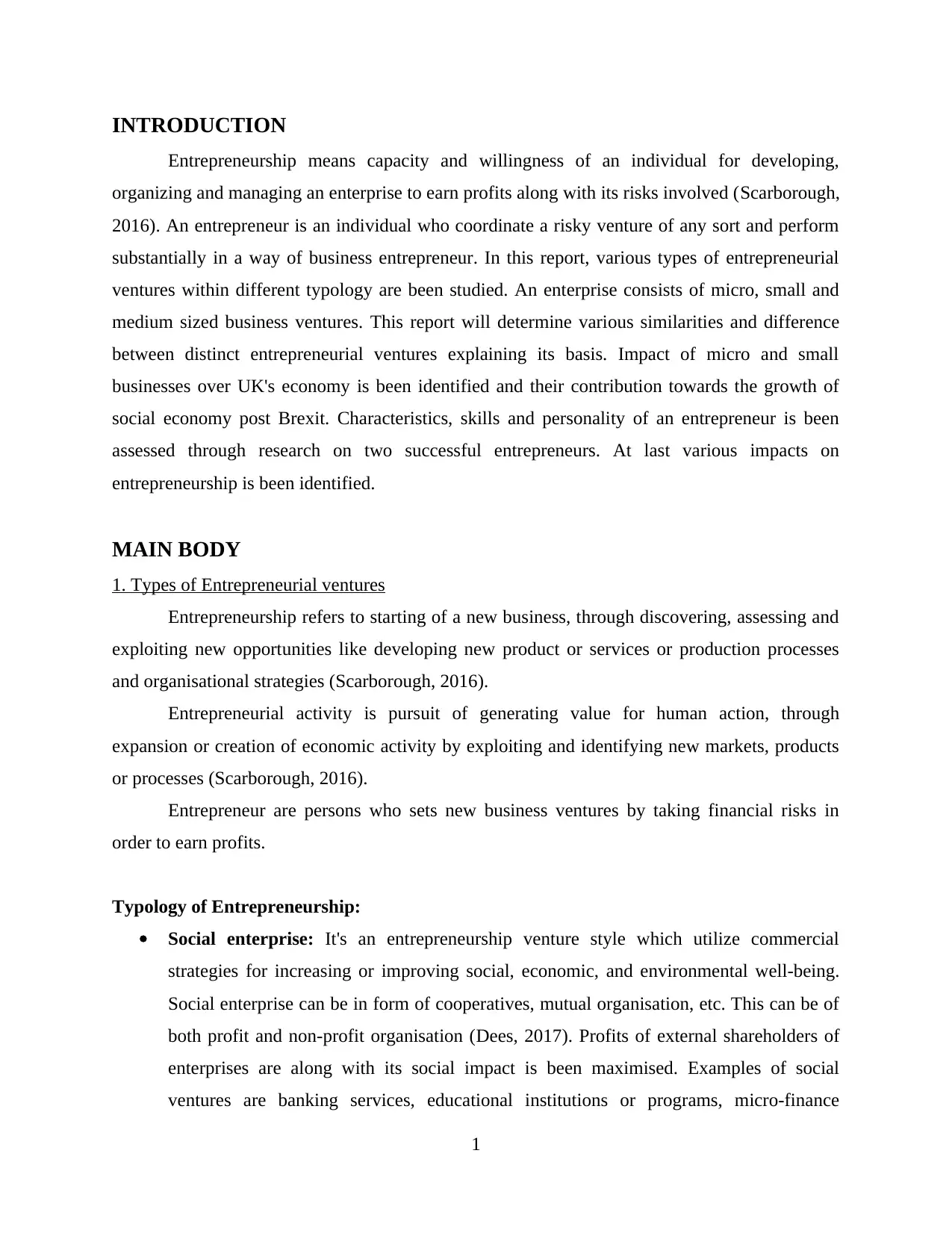
INTRODUCTION
Entrepreneurship means capacity and willingness of an individual for developing,
organizing and managing an enterprise to earn profits along with its risks involved (Scarborough,
2016). An entrepreneur is an individual who coordinate a risky venture of any sort and perform
substantially in a way of business entrepreneur. In this report, various types of entrepreneurial
ventures within different typology are been studied. An enterprise consists of micro, small and
medium sized business ventures. This report will determine various similarities and difference
between distinct entrepreneurial ventures explaining its basis. Impact of micro and small
businesses over UK's economy is been identified and their contribution towards the growth of
social economy post Brexit. Characteristics, skills and personality of an entrepreneur is been
assessed through research on two successful entrepreneurs. At last various impacts on
entrepreneurship is been identified.
MAIN BODY
1. Types of Entrepreneurial ventures
Entrepreneurship refers to starting of a new business, through discovering, assessing and
exploiting new opportunities like developing new product or services or production processes
and organisational strategies (Scarborough, 2016).
Entrepreneurial activity is pursuit of generating value for human action, through
expansion or creation of economic activity by exploiting and identifying new markets, products
or processes (Scarborough, 2016).
Entrepreneur are persons who sets new business ventures by taking financial risks in
order to earn profits.
Typology of Entrepreneurship:
Social enterprise: It's an entrepreneurship venture style which utilize commercial
strategies for increasing or improving social, economic, and environmental well-being.
Social enterprise can be in form of cooperatives, mutual organisation, etc. This can be of
both profit and non-profit organisation (Dees, 2017). Profits of external shareholders of
enterprises are along with its social impact is been maximised. Examples of social
ventures are banking services, educational institutions or programs, micro-finance
1
Entrepreneurship means capacity and willingness of an individual for developing,
organizing and managing an enterprise to earn profits along with its risks involved (Scarborough,
2016). An entrepreneur is an individual who coordinate a risky venture of any sort and perform
substantially in a way of business entrepreneur. In this report, various types of entrepreneurial
ventures within different typology are been studied. An enterprise consists of micro, small and
medium sized business ventures. This report will determine various similarities and difference
between distinct entrepreneurial ventures explaining its basis. Impact of micro and small
businesses over UK's economy is been identified and their contribution towards the growth of
social economy post Brexit. Characteristics, skills and personality of an entrepreneur is been
assessed through research on two successful entrepreneurs. At last various impacts on
entrepreneurship is been identified.
MAIN BODY
1. Types of Entrepreneurial ventures
Entrepreneurship refers to starting of a new business, through discovering, assessing and
exploiting new opportunities like developing new product or services or production processes
and organisational strategies (Scarborough, 2016).
Entrepreneurial activity is pursuit of generating value for human action, through
expansion or creation of economic activity by exploiting and identifying new markets, products
or processes (Scarborough, 2016).
Entrepreneur are persons who sets new business ventures by taking financial risks in
order to earn profits.
Typology of Entrepreneurship:
Social enterprise: It's an entrepreneurship venture style which utilize commercial
strategies for increasing or improving social, economic, and environmental well-being.
Social enterprise can be in form of cooperatives, mutual organisation, etc. This can be of
both profit and non-profit organisation (Dees, 2017). Profits of external shareholders of
enterprises are along with its social impact is been maximised. Examples of social
ventures are banking services, educational institutions or programs, micro-finance
1
⊘ This is a preview!⊘
Do you want full access?
Subscribe today to unlock all pages.

Trusted by 1+ million students worldwide
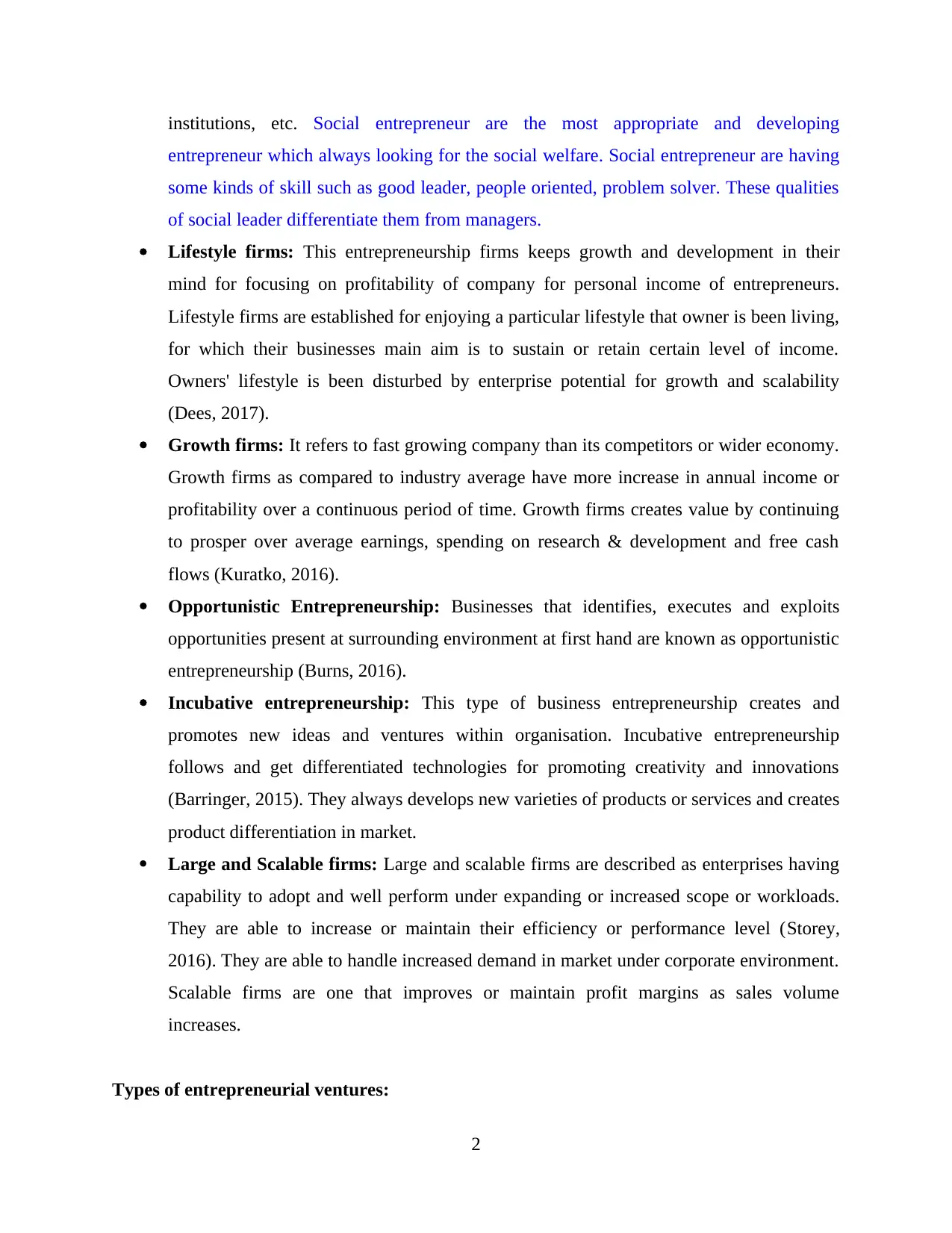
institutions, etc. Social entrepreneur are the most appropriate and developing
entrepreneur which always looking for the social welfare. Social entrepreneur are having
some kinds of skill such as good leader, people oriented, problem solver. These qualities
of social leader differentiate them from managers.
Lifestyle firms: This entrepreneurship firms keeps growth and development in their
mind for focusing on profitability of company for personal income of entrepreneurs.
Lifestyle firms are established for enjoying a particular lifestyle that owner is been living,
for which their businesses main aim is to sustain or retain certain level of income.
Owners' lifestyle is been disturbed by enterprise potential for growth and scalability
(Dees, 2017).
Growth firms: It refers to fast growing company than its competitors or wider economy.
Growth firms as compared to industry average have more increase in annual income or
profitability over a continuous period of time. Growth firms creates value by continuing
to prosper over average earnings, spending on research & development and free cash
flows (Kuratko, 2016).
Opportunistic Entrepreneurship: Businesses that identifies, executes and exploits
opportunities present at surrounding environment at first hand are known as opportunistic
entrepreneurship (Burns, 2016).
Incubative entrepreneurship: This type of business entrepreneurship creates and
promotes new ideas and ventures within organisation. Incubative entrepreneurship
follows and get differentiated technologies for promoting creativity and innovations
(Barringer, 2015). They always develops new varieties of products or services and creates
product differentiation in market.
Large and Scalable firms: Large and scalable firms are described as enterprises having
capability to adopt and well perform under expanding or increased scope or workloads.
They are able to increase or maintain their efficiency or performance level (Storey,
2016). They are able to handle increased demand in market under corporate environment.
Scalable firms are one that improves or maintain profit margins as sales volume
increases.
Types of entrepreneurial ventures:
2
entrepreneur which always looking for the social welfare. Social entrepreneur are having
some kinds of skill such as good leader, people oriented, problem solver. These qualities
of social leader differentiate them from managers.
Lifestyle firms: This entrepreneurship firms keeps growth and development in their
mind for focusing on profitability of company for personal income of entrepreneurs.
Lifestyle firms are established for enjoying a particular lifestyle that owner is been living,
for which their businesses main aim is to sustain or retain certain level of income.
Owners' lifestyle is been disturbed by enterprise potential for growth and scalability
(Dees, 2017).
Growth firms: It refers to fast growing company than its competitors or wider economy.
Growth firms as compared to industry average have more increase in annual income or
profitability over a continuous period of time. Growth firms creates value by continuing
to prosper over average earnings, spending on research & development and free cash
flows (Kuratko, 2016).
Opportunistic Entrepreneurship: Businesses that identifies, executes and exploits
opportunities present at surrounding environment at first hand are known as opportunistic
entrepreneurship (Burns, 2016).
Incubative entrepreneurship: This type of business entrepreneurship creates and
promotes new ideas and ventures within organisation. Incubative entrepreneurship
follows and get differentiated technologies for promoting creativity and innovations
(Barringer, 2015). They always develops new varieties of products or services and creates
product differentiation in market.
Large and Scalable firms: Large and scalable firms are described as enterprises having
capability to adopt and well perform under expanding or increased scope or workloads.
They are able to increase or maintain their efficiency or performance level (Storey,
2016). They are able to handle increased demand in market under corporate environment.
Scalable firms are one that improves or maintain profit margins as sales volume
increases.
Types of entrepreneurial ventures:
2
Paraphrase This Document
Need a fresh take? Get an instant paraphrase of this document with our AI Paraphraser
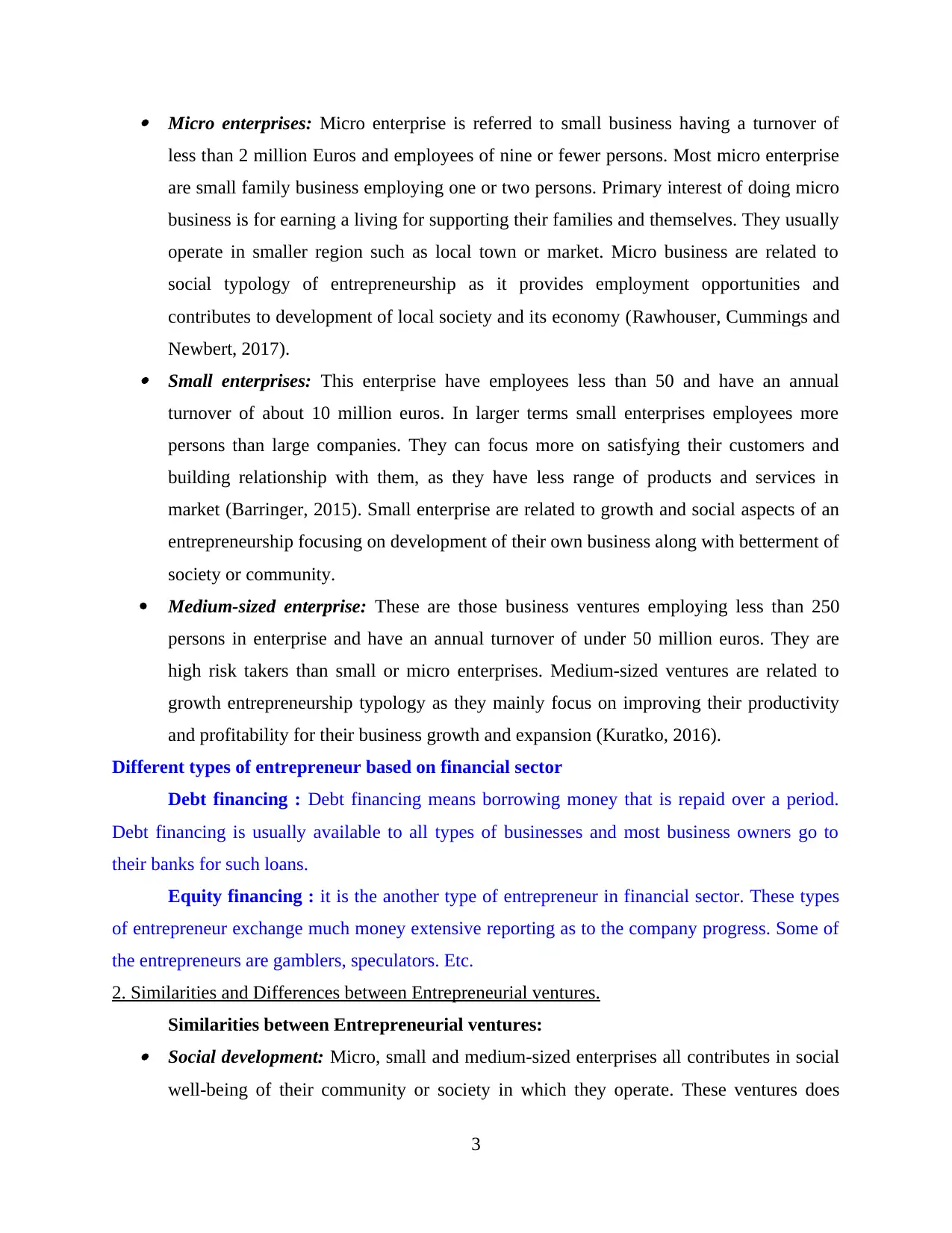
Micro enterprises: Micro enterprise is referred to small business having a turnover of
less than 2 million Euros and employees of nine or fewer persons. Most micro enterprise
are small family business employing one or two persons. Primary interest of doing micro
business is for earning a living for supporting their families and themselves. They usually
operate in smaller region such as local town or market. Micro business are related to
social typology of entrepreneurship as it provides employment opportunities and
contributes to development of local society and its economy (Rawhouser, Cummings and
Newbert, 2017). Small enterprises: This enterprise have employees less than 50 and have an annual
turnover of about 10 million euros. In larger terms small enterprises employees more
persons than large companies. They can focus more on satisfying their customers and
building relationship with them, as they have less range of products and services in
market (Barringer, 2015). Small enterprise are related to growth and social aspects of an
entrepreneurship focusing on development of their own business along with betterment of
society or community.
Medium-sized enterprise: These are those business ventures employing less than 250
persons in enterprise and have an annual turnover of under 50 million euros. They are
high risk takers than small or micro enterprises. Medium-sized ventures are related to
growth entrepreneurship typology as they mainly focus on improving their productivity
and profitability for their business growth and expansion (Kuratko, 2016).
Different types of entrepreneur based on financial sector
Debt financing : Debt financing means borrowing money that is repaid over a period.
Debt financing is usually available to all types of businesses and most business owners go to
their banks for such loans.
Equity financing : it is the another type of entrepreneur in financial sector. These types
of entrepreneur exchange much money extensive reporting as to the company progress. Some of
the entrepreneurs are gamblers, speculators. Etc.
2. Similarities and Differences between Entrepreneurial ventures.
Similarities between Entrepreneurial ventures: Social development: Micro, small and medium-sized enterprises all contributes in social
well-being of their community or society in which they operate. These ventures does
3
less than 2 million Euros and employees of nine or fewer persons. Most micro enterprise
are small family business employing one or two persons. Primary interest of doing micro
business is for earning a living for supporting their families and themselves. They usually
operate in smaller region such as local town or market. Micro business are related to
social typology of entrepreneurship as it provides employment opportunities and
contributes to development of local society and its economy (Rawhouser, Cummings and
Newbert, 2017). Small enterprises: This enterprise have employees less than 50 and have an annual
turnover of about 10 million euros. In larger terms small enterprises employees more
persons than large companies. They can focus more on satisfying their customers and
building relationship with them, as they have less range of products and services in
market (Barringer, 2015). Small enterprise are related to growth and social aspects of an
entrepreneurship focusing on development of their own business along with betterment of
society or community.
Medium-sized enterprise: These are those business ventures employing less than 250
persons in enterprise and have an annual turnover of under 50 million euros. They are
high risk takers than small or micro enterprises. Medium-sized ventures are related to
growth entrepreneurship typology as they mainly focus on improving their productivity
and profitability for their business growth and expansion (Kuratko, 2016).
Different types of entrepreneur based on financial sector
Debt financing : Debt financing means borrowing money that is repaid over a period.
Debt financing is usually available to all types of businesses and most business owners go to
their banks for such loans.
Equity financing : it is the another type of entrepreneur in financial sector. These types
of entrepreneur exchange much money extensive reporting as to the company progress. Some of
the entrepreneurs are gamblers, speculators. Etc.
2. Similarities and Differences between Entrepreneurial ventures.
Similarities between Entrepreneurial ventures: Social development: Micro, small and medium-sized enterprises all contributes in social
well-being of their community or society in which they operate. These ventures does
3
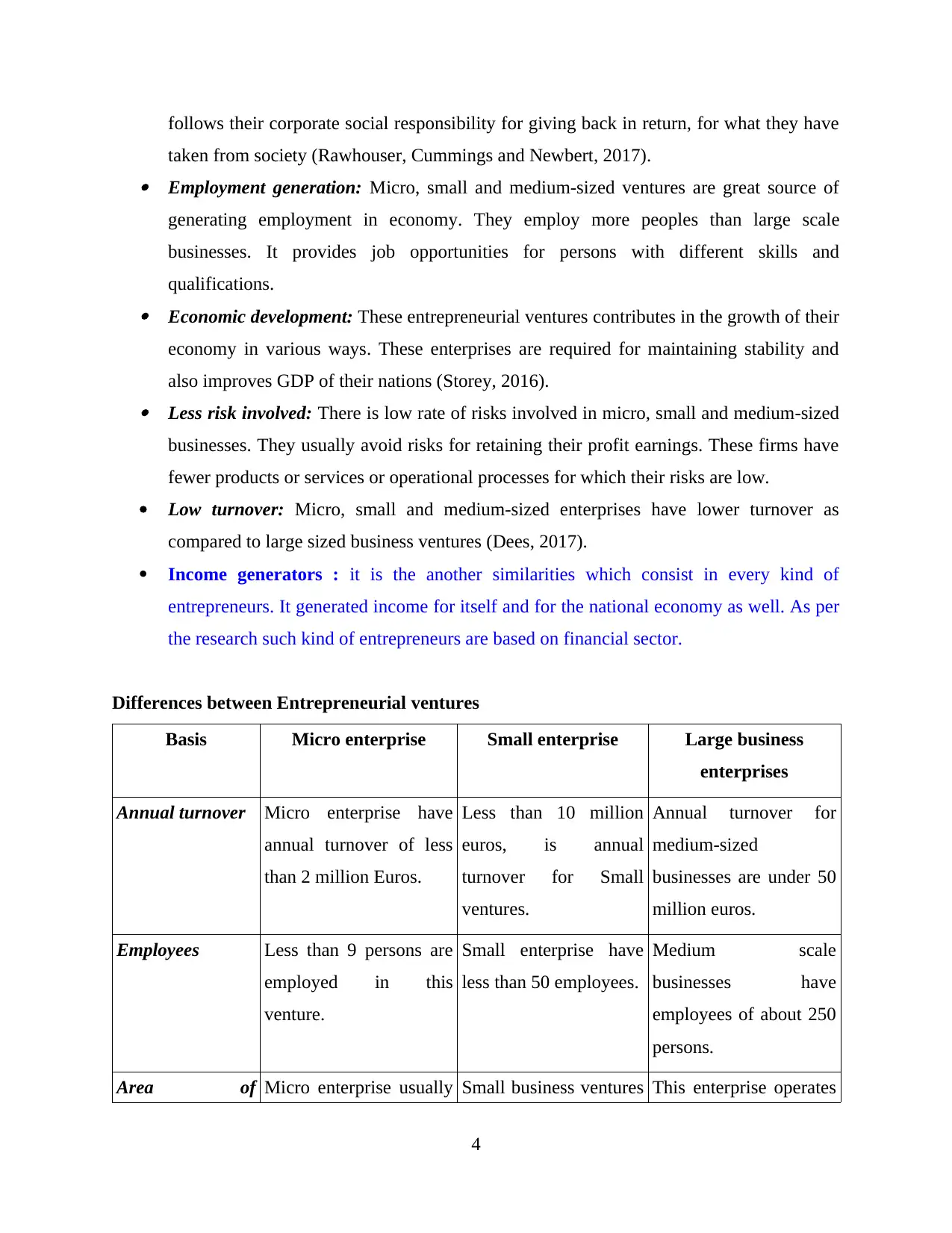
follows their corporate social responsibility for giving back in return, for what they have
taken from society (Rawhouser, Cummings and Newbert, 2017). Employment generation: Micro, small and medium-sized ventures are great source of
generating employment in economy. They employ more peoples than large scale
businesses. It provides job opportunities for persons with different skills and
qualifications. Economic development: These entrepreneurial ventures contributes in the growth of their
economy in various ways. These enterprises are required for maintaining stability and
also improves GDP of their nations (Storey, 2016). Less risk involved: There is low rate of risks involved in micro, small and medium-sized
businesses. They usually avoid risks for retaining their profit earnings. These firms have
fewer products or services or operational processes for which their risks are low.
Low turnover: Micro, small and medium-sized enterprises have lower turnover as
compared to large sized business ventures (Dees, 2017).
Income generators : it is the another similarities which consist in every kind of
entrepreneurs. It generated income for itself and for the national economy as well. As per
the research such kind of entrepreneurs are based on financial sector.
Differences between Entrepreneurial ventures
Basis Micro enterprise Small enterprise Large business
enterprises
Annual turnover Micro enterprise have
annual turnover of less
than 2 million Euros.
Less than 10 million
euros, is annual
turnover for Small
ventures.
Annual turnover for
medium-sized
businesses are under 50
million euros.
Employees Less than 9 persons are
employed in this
venture.
Small enterprise have
less than 50 employees.
Medium scale
businesses have
employees of about 250
persons.
Area of Micro enterprise usually Small business ventures This enterprise operates
4
taken from society (Rawhouser, Cummings and Newbert, 2017). Employment generation: Micro, small and medium-sized ventures are great source of
generating employment in economy. They employ more peoples than large scale
businesses. It provides job opportunities for persons with different skills and
qualifications. Economic development: These entrepreneurial ventures contributes in the growth of their
economy in various ways. These enterprises are required for maintaining stability and
also improves GDP of their nations (Storey, 2016). Less risk involved: There is low rate of risks involved in micro, small and medium-sized
businesses. They usually avoid risks for retaining their profit earnings. These firms have
fewer products or services or operational processes for which their risks are low.
Low turnover: Micro, small and medium-sized enterprises have lower turnover as
compared to large sized business ventures (Dees, 2017).
Income generators : it is the another similarities which consist in every kind of
entrepreneurs. It generated income for itself and for the national economy as well. As per
the research such kind of entrepreneurs are based on financial sector.
Differences between Entrepreneurial ventures
Basis Micro enterprise Small enterprise Large business
enterprises
Annual turnover Micro enterprise have
annual turnover of less
than 2 million Euros.
Less than 10 million
euros, is annual
turnover for Small
ventures.
Annual turnover for
medium-sized
businesses are under 50
million euros.
Employees Less than 9 persons are
employed in this
venture.
Small enterprise have
less than 50 employees.
Medium scale
businesses have
employees of about 250
persons.
Area of Micro enterprise usually Small business ventures This enterprise operates
4
⊘ This is a preview!⊘
Do you want full access?
Subscribe today to unlock all pages.

Trusted by 1+ million students worldwide
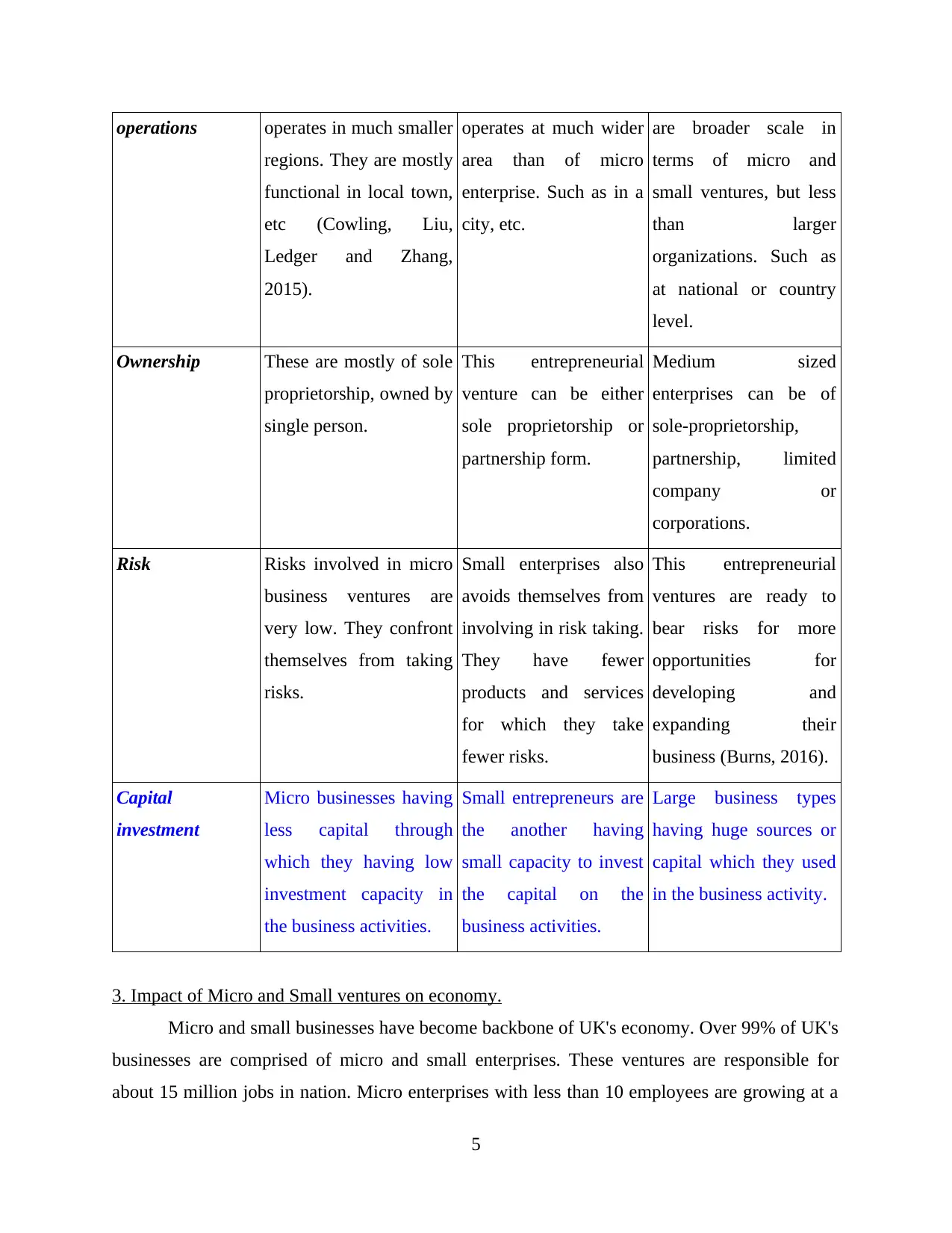
operations operates in much smaller
regions. They are mostly
functional in local town,
etc (Cowling, Liu,
Ledger and Zhang,
2015).
operates at much wider
area than of micro
enterprise. Such as in a
city, etc.
are broader scale in
terms of micro and
small ventures, but less
than larger
organizations. Such as
at national or country
level.
Ownership These are mostly of sole
proprietorship, owned by
single person.
This entrepreneurial
venture can be either
sole proprietorship or
partnership form.
Medium sized
enterprises can be of
sole-proprietorship,
partnership, limited
company or
corporations.
Risk Risks involved in micro
business ventures are
very low. They confront
themselves from taking
risks.
Small enterprises also
avoids themselves from
involving in risk taking.
They have fewer
products and services
for which they take
fewer risks.
This entrepreneurial
ventures are ready to
bear risks for more
opportunities for
developing and
expanding their
business (Burns, 2016).
Capital
investment
Micro businesses having
less capital through
which they having low
investment capacity in
the business activities.
Small entrepreneurs are
the another having
small capacity to invest
the capital on the
business activities.
Large business types
having huge sources or
capital which they used
in the business activity.
3. Impact of Micro and Small ventures on economy.
Micro and small businesses have become backbone of UK's economy. Over 99% of UK's
businesses are comprised of micro and small enterprises. These ventures are responsible for
about 15 million jobs in nation. Micro enterprises with less than 10 employees are growing at a
5
regions. They are mostly
functional in local town,
etc (Cowling, Liu,
Ledger and Zhang,
2015).
operates at much wider
area than of micro
enterprise. Such as in a
city, etc.
are broader scale in
terms of micro and
small ventures, but less
than larger
organizations. Such as
at national or country
level.
Ownership These are mostly of sole
proprietorship, owned by
single person.
This entrepreneurial
venture can be either
sole proprietorship or
partnership form.
Medium sized
enterprises can be of
sole-proprietorship,
partnership, limited
company or
corporations.
Risk Risks involved in micro
business ventures are
very low. They confront
themselves from taking
risks.
Small enterprises also
avoids themselves from
involving in risk taking.
They have fewer
products and services
for which they take
fewer risks.
This entrepreneurial
ventures are ready to
bear risks for more
opportunities for
developing and
expanding their
business (Burns, 2016).
Capital
investment
Micro businesses having
less capital through
which they having low
investment capacity in
the business activities.
Small entrepreneurs are
the another having
small capacity to invest
the capital on the
business activities.
Large business types
having huge sources or
capital which they used
in the business activity.
3. Impact of Micro and Small ventures on economy.
Micro and small businesses have become backbone of UK's economy. Over 99% of UK's
businesses are comprised of micro and small enterprises. These ventures are responsible for
about 15 million jobs in nation. Micro enterprises with less than 10 employees are growing at a
5
Paraphrase This Document
Need a fresh take? Get an instant paraphrase of this document with our AI Paraphraser
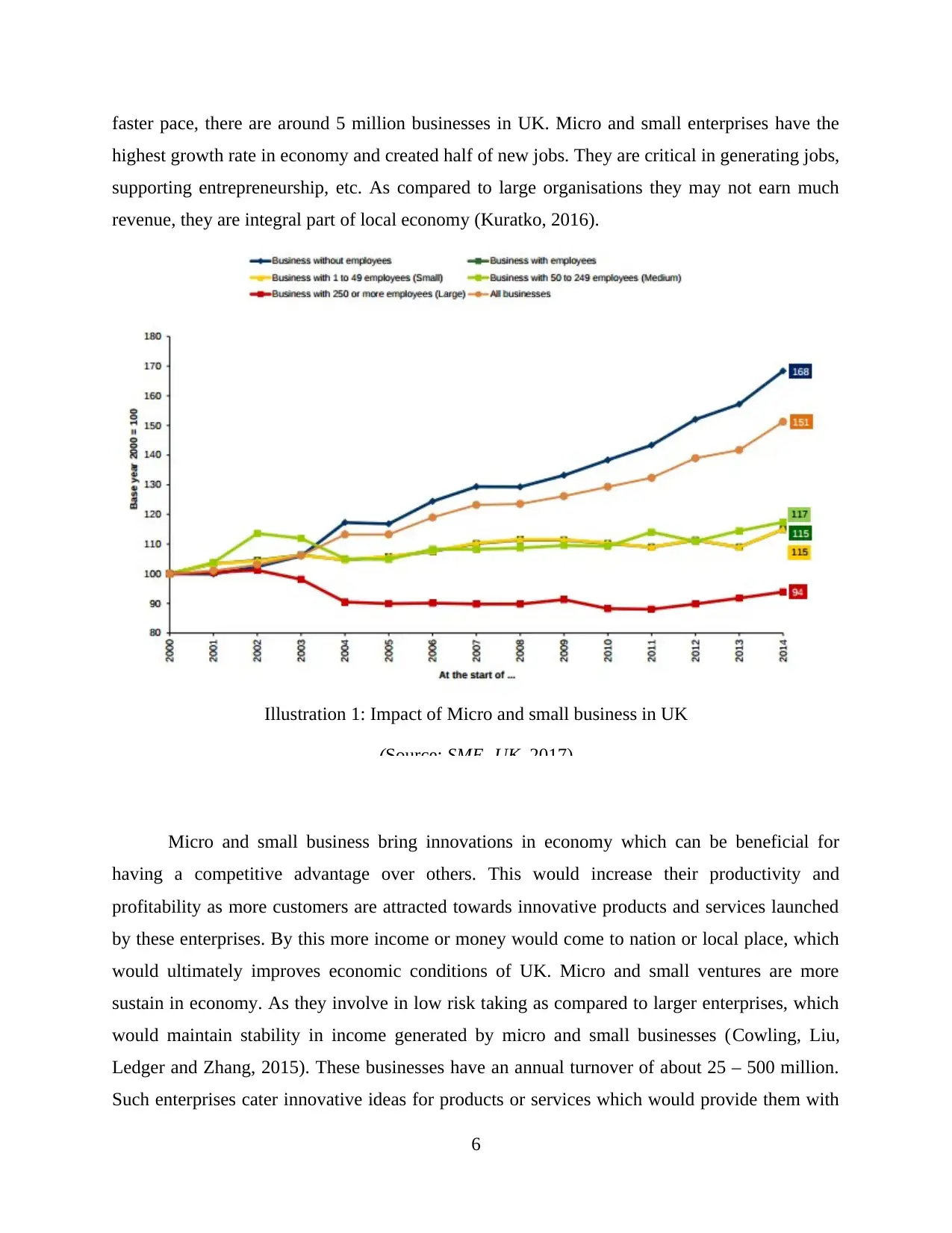
faster pace, there are around 5 million businesses in UK. Micro and small enterprises have the
highest growth rate in economy and created half of new jobs. They are critical in generating jobs,
supporting entrepreneurship, etc. As compared to large organisations they may not earn much
revenue, they are integral part of local economy (Kuratko, 2016).
Micro and small business bring innovations in economy which can be beneficial for
having a competitive advantage over others. This would increase their productivity and
profitability as more customers are attracted towards innovative products and services launched
by these enterprises. By this more income or money would come to nation or local place, which
would ultimately improves economic conditions of UK. Micro and small ventures are more
sustain in economy. As they involve in low risk taking as compared to larger enterprises, which
would maintain stability in income generated by micro and small businesses (Cowling, Liu,
Ledger and Zhang, 2015). These businesses have an annual turnover of about 25 – 500 million.
Such enterprises cater innovative ideas for products or services which would provide them with
6
Illustration 1: Impact of Micro and small business in UK
(Source: SME- UK, 2017)
highest growth rate in economy and created half of new jobs. They are critical in generating jobs,
supporting entrepreneurship, etc. As compared to large organisations they may not earn much
revenue, they are integral part of local economy (Kuratko, 2016).
Micro and small business bring innovations in economy which can be beneficial for
having a competitive advantage over others. This would increase their productivity and
profitability as more customers are attracted towards innovative products and services launched
by these enterprises. By this more income or money would come to nation or local place, which
would ultimately improves economic conditions of UK. Micro and small ventures are more
sustain in economy. As they involve in low risk taking as compared to larger enterprises, which
would maintain stability in income generated by micro and small businesses (Cowling, Liu,
Ledger and Zhang, 2015). These businesses have an annual turnover of about 25 – 500 million.
Such enterprises cater innovative ideas for products or services which would provide them with
6
Illustration 1: Impact of Micro and small business in UK
(Source: SME- UK, 2017)
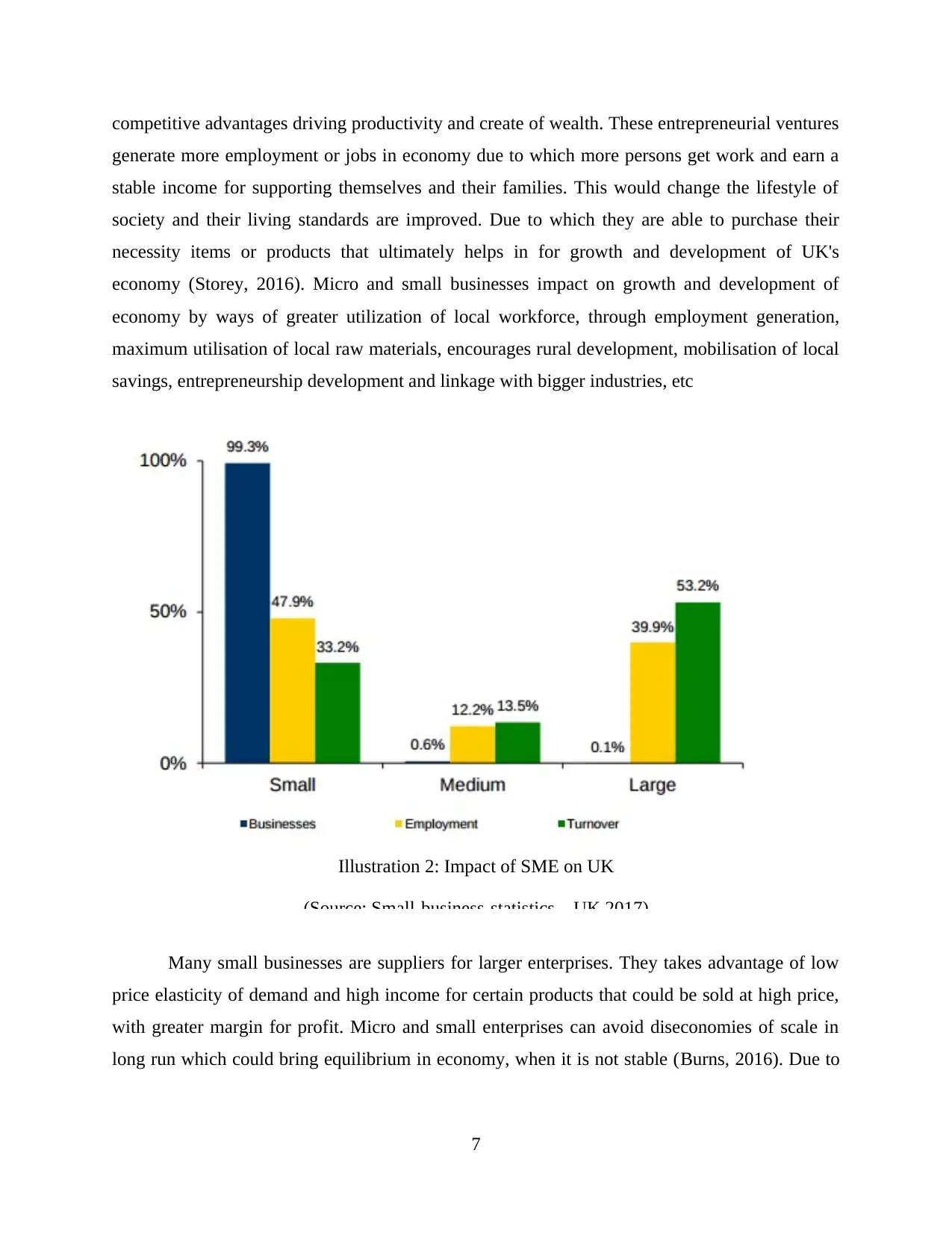
competitive advantages driving productivity and create of wealth. These entrepreneurial ventures
generate more employment or jobs in economy due to which more persons get work and earn a
stable income for supporting themselves and their families. This would change the lifestyle of
society and their living standards are improved. Due to which they are able to purchase their
necessity items or products that ultimately helps in for growth and development of UK's
economy (Storey, 2016). Micro and small businesses impact on growth and development of
economy by ways of greater utilization of local workforce, through employment generation,
maximum utilisation of local raw materials, encourages rural development, mobilisation of local
savings, entrepreneurship development and linkage with bigger industries, etc
Many small businesses are suppliers for larger enterprises. They takes advantage of low
price elasticity of demand and high income for certain products that could be sold at high price,
with greater margin for profit. Micro and small enterprises can avoid diseconomies of scale in
long run which could bring equilibrium in economy, when it is not stable (Burns, 2016). Due to
7
Illustration 2: Impact of SME on UK
(Source: Small-business-statistics – UK 2017)
generate more employment or jobs in economy due to which more persons get work and earn a
stable income for supporting themselves and their families. This would change the lifestyle of
society and their living standards are improved. Due to which they are able to purchase their
necessity items or products that ultimately helps in for growth and development of UK's
economy (Storey, 2016). Micro and small businesses impact on growth and development of
economy by ways of greater utilization of local workforce, through employment generation,
maximum utilisation of local raw materials, encourages rural development, mobilisation of local
savings, entrepreneurship development and linkage with bigger industries, etc
Many small businesses are suppliers for larger enterprises. They takes advantage of low
price elasticity of demand and high income for certain products that could be sold at high price,
with greater margin for profit. Micro and small enterprises can avoid diseconomies of scale in
long run which could bring equilibrium in economy, when it is not stable (Burns, 2016). Due to
7
Illustration 2: Impact of SME on UK
(Source: Small-business-statistics – UK 2017)
⊘ This is a preview!⊘
Do you want full access?
Subscribe today to unlock all pages.

Trusted by 1+ million students worldwide
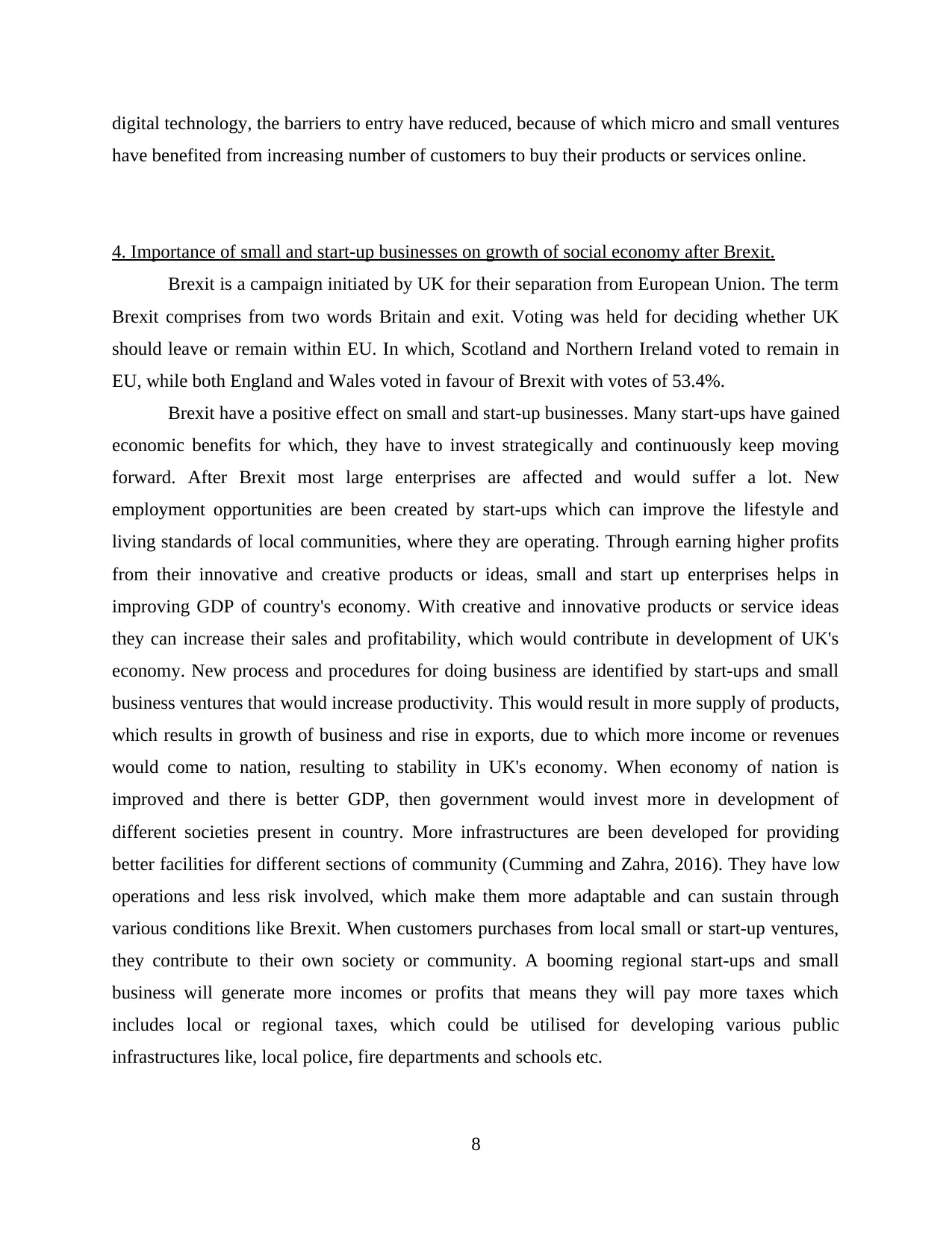
digital technology, the barriers to entry have reduced, because of which micro and small ventures
have benefited from increasing number of customers to buy their products or services online.
4. Importance of small and start-up businesses on growth of social economy after Brexit.
Brexit is a campaign initiated by UK for their separation from European Union. The term
Brexit comprises from two words Britain and exit. Voting was held for deciding whether UK
should leave or remain within EU. In which, Scotland and Northern Ireland voted to remain in
EU, while both England and Wales voted in favour of Brexit with votes of 53.4%.
Brexit have a positive effect on small and start-up businesses. Many start-ups have gained
economic benefits for which, they have to invest strategically and continuously keep moving
forward. After Brexit most large enterprises are affected and would suffer a lot. New
employment opportunities are been created by start-ups which can improve the lifestyle and
living standards of local communities, where they are operating. Through earning higher profits
from their innovative and creative products or ideas, small and start up enterprises helps in
improving GDP of country's economy. With creative and innovative products or service ideas
they can increase their sales and profitability, which would contribute in development of UK's
economy. New process and procedures for doing business are identified by start-ups and small
business ventures that would increase productivity. This would result in more supply of products,
which results in growth of business and rise in exports, due to which more income or revenues
would come to nation, resulting to stability in UK's economy. When economy of nation is
improved and there is better GDP, then government would invest more in development of
different societies present in country. More infrastructures are been developed for providing
better facilities for different sections of community (Cumming and Zahra, 2016). They have low
operations and less risk involved, which make them more adaptable and can sustain through
various conditions like Brexit. When customers purchases from local small or start-up ventures,
they contribute to their own society or community. A booming regional start-ups and small
business will generate more incomes or profits that means they will pay more taxes which
includes local or regional taxes, which could be utilised for developing various public
infrastructures like, local police, fire departments and schools etc.
8
have benefited from increasing number of customers to buy their products or services online.
4. Importance of small and start-up businesses on growth of social economy after Brexit.
Brexit is a campaign initiated by UK for their separation from European Union. The term
Brexit comprises from two words Britain and exit. Voting was held for deciding whether UK
should leave or remain within EU. In which, Scotland and Northern Ireland voted to remain in
EU, while both England and Wales voted in favour of Brexit with votes of 53.4%.
Brexit have a positive effect on small and start-up businesses. Many start-ups have gained
economic benefits for which, they have to invest strategically and continuously keep moving
forward. After Brexit most large enterprises are affected and would suffer a lot. New
employment opportunities are been created by start-ups which can improve the lifestyle and
living standards of local communities, where they are operating. Through earning higher profits
from their innovative and creative products or ideas, small and start up enterprises helps in
improving GDP of country's economy. With creative and innovative products or service ideas
they can increase their sales and profitability, which would contribute in development of UK's
economy. New process and procedures for doing business are identified by start-ups and small
business ventures that would increase productivity. This would result in more supply of products,
which results in growth of business and rise in exports, due to which more income or revenues
would come to nation, resulting to stability in UK's economy. When economy of nation is
improved and there is better GDP, then government would invest more in development of
different societies present in country. More infrastructures are been developed for providing
better facilities for different sections of community (Cumming and Zahra, 2016). They have low
operations and less risk involved, which make them more adaptable and can sustain through
various conditions like Brexit. When customers purchases from local small or start-up ventures,
they contribute to their own society or community. A booming regional start-ups and small
business will generate more incomes or profits that means they will pay more taxes which
includes local or regional taxes, which could be utilised for developing various public
infrastructures like, local police, fire departments and schools etc.
8
Paraphrase This Document
Need a fresh take? Get an instant paraphrase of this document with our AI Paraphraser
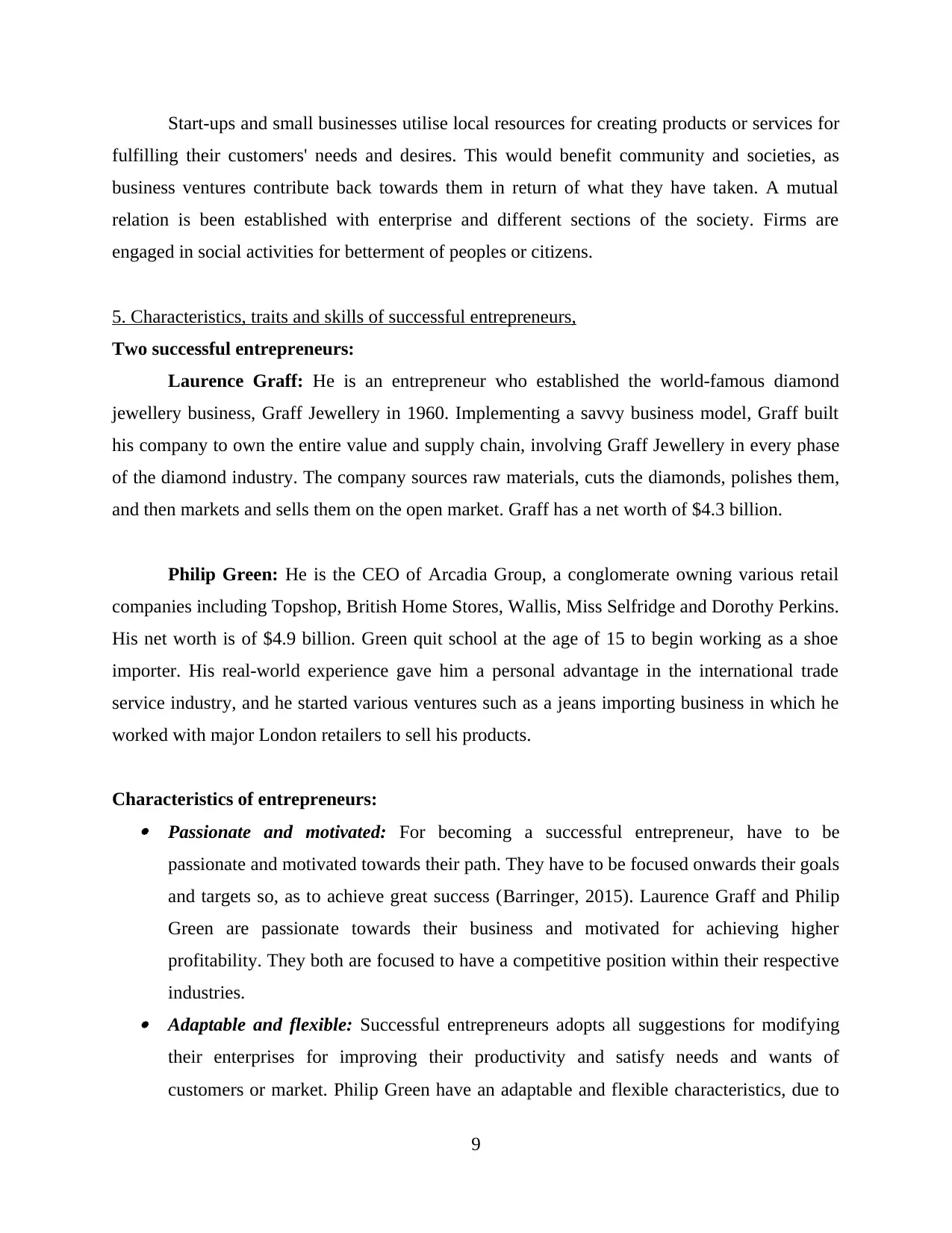
Start-ups and small businesses utilise local resources for creating products or services for
fulfilling their customers' needs and desires. This would benefit community and societies, as
business ventures contribute back towards them in return of what they have taken. A mutual
relation is been established with enterprise and different sections of the society. Firms are
engaged in social activities for betterment of peoples or citizens.
5. Characteristics, traits and skills of successful entrepreneurs,
Two successful entrepreneurs:
Laurence Graff: He is an entrepreneur who established the world-famous diamond
jewellery business, Graff Jewellery in 1960. Implementing a savvy business model, Graff built
his company to own the entire value and supply chain, involving Graff Jewellery in every phase
of the diamond industry. The company sources raw materials, cuts the diamonds, polishes them,
and then markets and sells them on the open market. Graff has a net worth of $4.3 billion.
Philip Green: He is the CEO of Arcadia Group, a conglomerate owning various retail
companies including Topshop, British Home Stores, Wallis, Miss Selfridge and Dorothy Perkins.
His net worth is of $4.9 billion. Green quit school at the age of 15 to begin working as a shoe
importer. His real-world experience gave him a personal advantage in the international trade
service industry, and he started various ventures such as a jeans importing business in which he
worked with major London retailers to sell his products.
Characteristics of entrepreneurs: Passionate and motivated: For becoming a successful entrepreneur, have to be
passionate and motivated towards their path. They have to be focused onwards their goals
and targets so, as to achieve great success (Barringer, 2015). Laurence Graff and Philip
Green are passionate towards their business and motivated for achieving higher
profitability. They both are focused to have a competitive position within their respective
industries. Adaptable and flexible: Successful entrepreneurs adopts all suggestions for modifying
their enterprises for improving their productivity and satisfy needs and wants of
customers or market. Philip Green have an adaptable and flexible characteristics, due to
9
fulfilling their customers' needs and desires. This would benefit community and societies, as
business ventures contribute back towards them in return of what they have taken. A mutual
relation is been established with enterprise and different sections of the society. Firms are
engaged in social activities for betterment of peoples or citizens.
5. Characteristics, traits and skills of successful entrepreneurs,
Two successful entrepreneurs:
Laurence Graff: He is an entrepreneur who established the world-famous diamond
jewellery business, Graff Jewellery in 1960. Implementing a savvy business model, Graff built
his company to own the entire value and supply chain, involving Graff Jewellery in every phase
of the diamond industry. The company sources raw materials, cuts the diamonds, polishes them,
and then markets and sells them on the open market. Graff has a net worth of $4.3 billion.
Philip Green: He is the CEO of Arcadia Group, a conglomerate owning various retail
companies including Topshop, British Home Stores, Wallis, Miss Selfridge and Dorothy Perkins.
His net worth is of $4.9 billion. Green quit school at the age of 15 to begin working as a shoe
importer. His real-world experience gave him a personal advantage in the international trade
service industry, and he started various ventures such as a jeans importing business in which he
worked with major London retailers to sell his products.
Characteristics of entrepreneurs: Passionate and motivated: For becoming a successful entrepreneur, have to be
passionate and motivated towards their path. They have to be focused onwards their goals
and targets so, as to achieve great success (Barringer, 2015). Laurence Graff and Philip
Green are passionate towards their business and motivated for achieving higher
profitability. They both are focused to have a competitive position within their respective
industries. Adaptable and flexible: Successful entrepreneurs adopts all suggestions for modifying
their enterprises for improving their productivity and satisfy needs and wants of
customers or market. Philip Green have an adaptable and flexible characteristics, due to
9
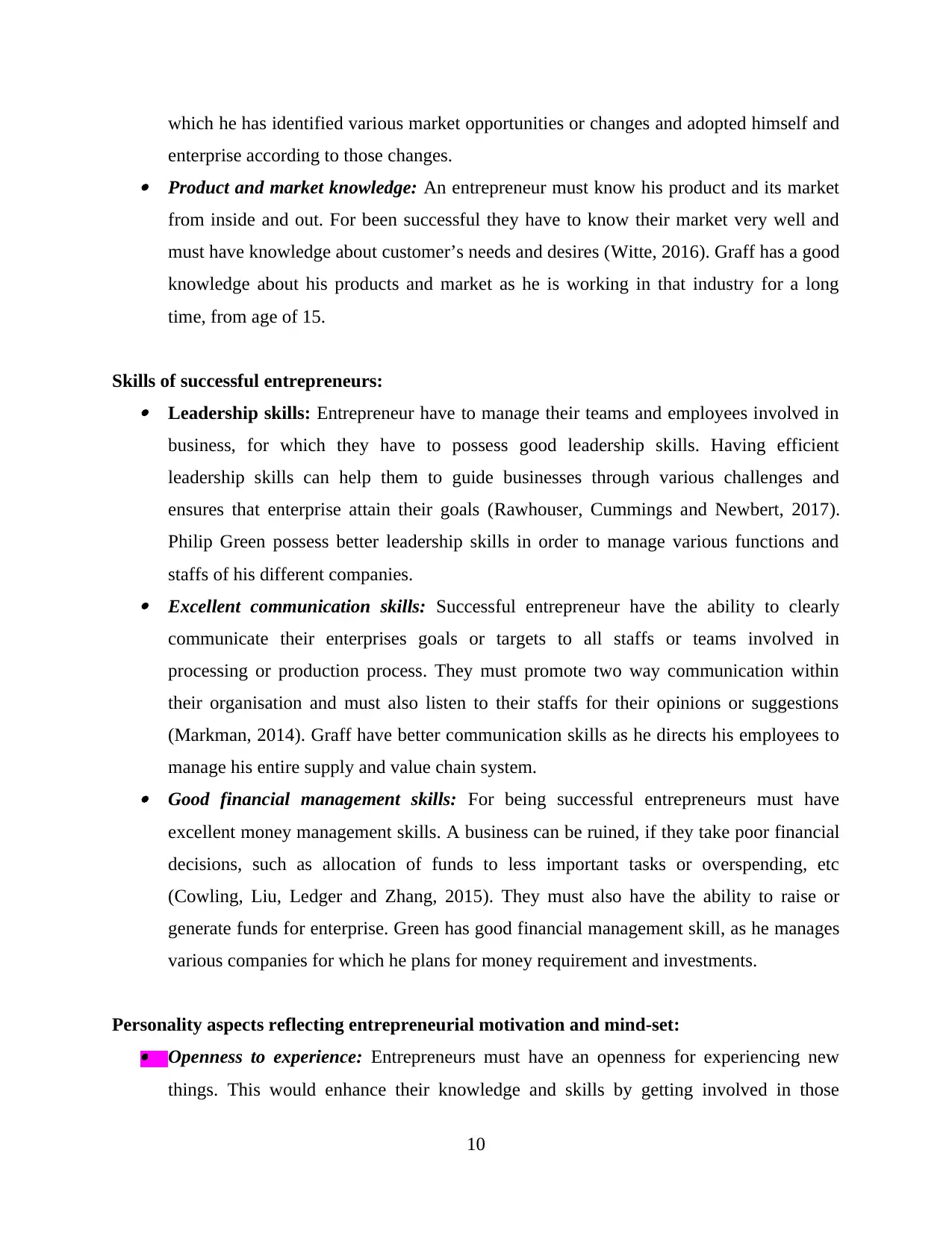
which he has identified various market opportunities or changes and adopted himself and
enterprise according to those changes. Product and market knowledge: An entrepreneur must know his product and its market
from inside and out. For been successful they have to know their market very well and
must have knowledge about customer’s needs and desires (Witte, 2016). Graff has a good
knowledge about his products and market as he is working in that industry for a long
time, from age of 15.
Skills of successful entrepreneurs: Leadership skills: Entrepreneur have to manage their teams and employees involved in
business, for which they have to possess good leadership skills. Having efficient
leadership skills can help them to guide businesses through various challenges and
ensures that enterprise attain their goals (Rawhouser, Cummings and Newbert, 2017).
Philip Green possess better leadership skills in order to manage various functions and
staffs of his different companies. Excellent communication skills: Successful entrepreneur have the ability to clearly
communicate their enterprises goals or targets to all staffs or teams involved in
processing or production process. They must promote two way communication within
their organisation and must also listen to their staffs for their opinions or suggestions
(Markman, 2014). Graff have better communication skills as he directs his employees to
manage his entire supply and value chain system. Good financial management skills: For being successful entrepreneurs must have
excellent money management skills. A business can be ruined, if they take poor financial
decisions, such as allocation of funds to less important tasks or overspending, etc
(Cowling, Liu, Ledger and Zhang, 2015). They must also have the ability to raise or
generate funds for enterprise. Green has good financial management skill, as he manages
various companies for which he plans for money requirement and investments.
Personality aspects reflecting entrepreneurial motivation and mind-set: Openness to experience: Entrepreneurs must have an openness for experiencing new
things. This would enhance their knowledge and skills by getting involved in those
10
enterprise according to those changes. Product and market knowledge: An entrepreneur must know his product and its market
from inside and out. For been successful they have to know their market very well and
must have knowledge about customer’s needs and desires (Witte, 2016). Graff has a good
knowledge about his products and market as he is working in that industry for a long
time, from age of 15.
Skills of successful entrepreneurs: Leadership skills: Entrepreneur have to manage their teams and employees involved in
business, for which they have to possess good leadership skills. Having efficient
leadership skills can help them to guide businesses through various challenges and
ensures that enterprise attain their goals (Rawhouser, Cummings and Newbert, 2017).
Philip Green possess better leadership skills in order to manage various functions and
staffs of his different companies. Excellent communication skills: Successful entrepreneur have the ability to clearly
communicate their enterprises goals or targets to all staffs or teams involved in
processing or production process. They must promote two way communication within
their organisation and must also listen to their staffs for their opinions or suggestions
(Markman, 2014). Graff have better communication skills as he directs his employees to
manage his entire supply and value chain system. Good financial management skills: For being successful entrepreneurs must have
excellent money management skills. A business can be ruined, if they take poor financial
decisions, such as allocation of funds to less important tasks or overspending, etc
(Cowling, Liu, Ledger and Zhang, 2015). They must also have the ability to raise or
generate funds for enterprise. Green has good financial management skill, as he manages
various companies for which he plans for money requirement and investments.
Personality aspects reflecting entrepreneurial motivation and mind-set: Openness to experience: Entrepreneurs must have an openness for experiencing new
things. This would enhance their knowledge and skills by getting involved in those
10
⊘ This is a preview!⊘
Do you want full access?
Subscribe today to unlock all pages.

Trusted by 1+ million students worldwide
1 out of 16
Related Documents
Your All-in-One AI-Powered Toolkit for Academic Success.
+13062052269
info@desklib.com
Available 24*7 on WhatsApp / Email
![[object Object]](/_next/static/media/star-bottom.7253800d.svg)
Unlock your academic potential
Copyright © 2020–2026 A2Z Services. All Rights Reserved. Developed and managed by ZUCOL.





